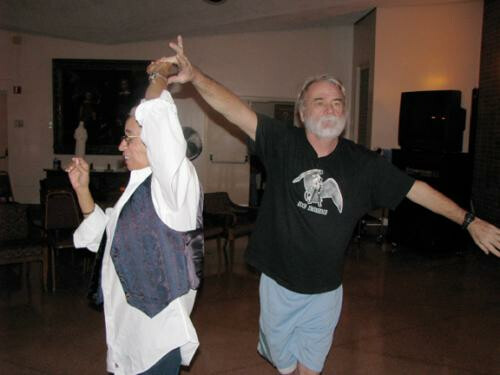
Retreats offer healing
By Lesli Bales-Sherrod
UMConnection Correspondent
Thomas Rostek wears a tiny button that speaks volumes. "You don't have to be infected to be affected," it reads.
 Rostek was diagnosed with HIV/AIDS in October 1993 and has been coming to Quality of Life Retreats twice a year ever since.
Rostek was diagnosed with HIV/AIDS in October 1993 and has been coming to Quality of Life Retreats twice a year ever since.
"When I come here, I need some spiritual rejuvenation and my energy levels need to be replenished, and that's what I get from these retreats," he said, donning a Santa hat on the first day of the December retreat. "Without them, maybe I would have died years ago."
But 20 years after the Baltimore-Washington Conference launched Quality of Life Retreats for people living with HIV/AIDS, Rostek is still here. And so is Malcolm Coley, diagnosed in January 1988, and Raymond Shattuck, diagnosed in April 1991, and the list goes on.
"Did I think I was going to live this long? No," said Shattuck, who directs the February retreat and served as co-director of the December retreat this year. "You'd see people at a retreat, and then not see them again. That's how fast people were dying."
Now Quality of Life Retreats, held four times a year, isn't about the dying. It's about the living.
"Surviving HIV is not the issue," said Josette Foster, a registered nurse who has volunteered with Quality of Life Retreats for more than 10 years. "It's surviving life - homelessness, how to stay sober, how to have relationships."
People with HIV/AIDS are living longer, having careers, getting married. Still, "when people get a death sentence, it kind of knocks you for a loop," said Coley, who directed the September and December retreats this year. "When they hear HIV, they hear AIDS and death."
The Quality of Life Retreats' goal is to provide a coping and connecting experience. From guest speakers on topics such as advocacy and acupuncture to sharing in small groups about medicine and side effects, participants come away with education that helps them "navigate through the maze of ‘stuff' to get where they need to go," Coley said.
Questions get answered that a doctor may not have had time to, Foster added. "What's a long-term survivor to a person newly diagnosed?" she asked. "‘Wow. They've been living that long. I can do it, too.'"
There's also the support of others living with HIV/AIDS, with all participants paired with a "prayer buddy" during the retreats. Foster remembers a woman who could not say the words "HIV positive" at the beginning of a retreat, but was able to by the end, through the encouragement of the group.
And, sometimes, there's healing.
"I'll never forget this; I hold onto this like an angel," said Shattuck, remembering a woman whose prosthesis gave her such pain that she had to use a wheelchair, until after the retreat's healing service. Even now, retelling the story, he gets "goose bumps."
The healing isn't always physical, it comes in many forms.
"I can see, from a mental wellness perspective, how they really need this break," said Lance Hogue, a nurse practitioner who sits on the Quality of Life Retreats board and also is a person living with HIV. "We let people let their walls down."
"It's a place they can go so they don't feel so alone," said Claudette Williams, who has been volunteering with Quality of Life Retreats for about three years.
Coley agreed.
"It helps me to know without a shadow of a doubt that I'm not by myself," he said. "And that's the biggest comfort."
In fact, Quality of Life Retreat board members Coley and Shattuck said it is even more rewarding for them to work the retreats than it was to attend them.
"I'm giving back what's been given to me at the retreats: love, honor and respect," said Shattuck, who also manages the Quality of Life Retreats Web site at www.qualityofliferetreatshiv.org. "I watch people come in with pain and leave with joys they've never imagined having."
"It's good to be the light that says it's going to be OK," Coley said. "Somebody was that light for me."
The demographics of the Quality of Life Retreats may have changed since Frederick District Superintendent, the Rev. Terri Rae Chattin, directed the first one in September 1988, but what she gets from her continued experienced with Quality of Life Retreats remains the same.
"It keeps me in touch with the diversity of God's people," Chattin said. "I can live in a bubble, and these retreats have helped me not to do that. I see people, and I see the real struggles. It has made me very conscious that the church isn't just about those of us who sit there on Sunday mornings."
The retreats, Coley said, are "just a glimpse of what the wider picture is" as HIV/AIDS perpetuates. In 2008, Centers for Disease Control estimated that 56,300 people were newly infected in 2006, the most recent year that data are available, according to its Web site. At the December retreat, about two-thirds of the participants were new to Quality of Life Retreats, and five were younger than 25, Coley said.
And so Rostek will keep coming back.
"There's got to be a reason for me to be here - to be a healer and a teacher for those coming down the road, newly diagnosed, because after their diagnosis, there's life," he said. "These retreats have made me the person I am."

Login/Register to leave comment